九年级英语教学进度表
- 格式:docx
- 大小:16.82 KB
- 文档页数:2
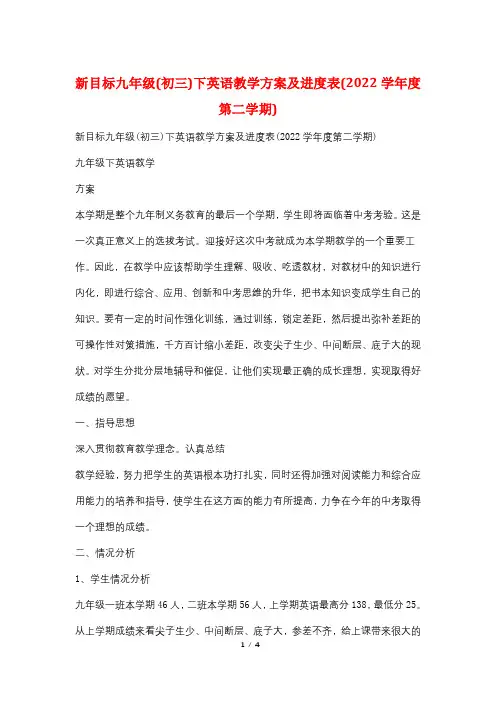
新目标九年级(初三)下英语教学方案及进度表(2022学年度第二学期)新目标九年级(初三)下英语教学方案及进度表(2022学年度第二学期)九年级下英语教学方案本学期是整个九年制义务教育的最后一个学期,学生即将面临着中考考验。
这是一次真正意义上的选拔考试。
迎接好这次中考就成为本学期教学的一个重要工作。
因此,在教学中应该帮助学生理解、吸收、吃透教材,对教材中的知识进行内化,即进行综合、应用、创新和中考思维的升华,把书本知识变成学生自己的知识。
要有一定的时间作强化训练,通过训练,锁定差距,然后提出弥补差距的可操作性对策措施,千方百计缩小差距,改变尖子生少、中间断层、底子大的现状。
对学生分批分层地辅导和催促,让他们实现最正确的成长理想,实现取得好成绩的愿望。
一、指导思想深入贯彻教育教学理念。
认真总结教学经验,努力把学生的英语根本功打扎实,同时还得加强对阅读能力和综合应用能力的培养和指导,使学生在这方面的能力有所提高,力争在今年的中考取得一个理想的成绩。
二、情况分析1、学生情况分析九年级一班本学期46人,二班本学期56人,上学期英语最高分138,最低分25。
从上学期成绩来看尖子生少、中间断层、底子大,参差不齐,给上课带来很大的难度,平均分不及过差线。
大局部学生根底差,想学的少,在里面混日子的有很的大一局部,男生居多。
他们的学习情绪不稳定,也不能坚持不懈,少数几个中间生平时根本能够配合老师的教学,但自觉性和定性缺乏,有些默不出声,精神不振,课后很少复习功课,上课不注意听讲,问题出来了不动脑筋想,而是急于去想课本上找答案,半天说不出个所以然来,学习方法不灵活,需要老师的催促才会有所作为;也有个别学生属于不思进取型,积极性和主动性极差,他们或偏科甚至对英语学习毫无兴趣。
2、教材分析本学年英语教学内容为一册,共15个单元,从上学期结束已经上完12个单元,剩余3个单元方案在4周内完成教学任务。
具体教学内容包括:词汇:识记、理解、掌握书中的所有单词,熟练应用重点单词和短语,复习初中前四册中的所有单词。
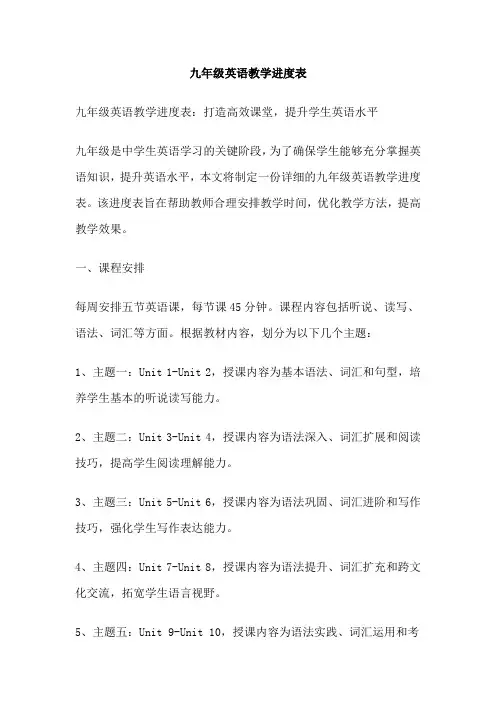
九年级英语教学进度表九年级英语教学进度表:打造高效课堂,提升学生英语水平九年级是中学生英语学习的关键阶段,为了确保学生能够充分掌握英语知识,提升英语水平,本文将制定一份详细的九年级英语教学进度表。
该进度表旨在帮助教师合理安排教学时间,优化教学方法,提高教学效果。
一、课程安排每周安排五节英语课,每节课45分钟。
课程内容包括听说、读写、语法、词汇等方面。
根据教材内容,划分为以下几个主题:1、主题一:Unit 1-Unit 2,授课内容为基本语法、词汇和句型,培养学生基本的听说读写能力。
2、主题二:Unit 3-Unit 4,授课内容为语法深入、词汇扩展和阅读技巧,提高学生阅读理解能力。
3、主题三:Unit 5-Unit 6,授课内容为语法巩固、词汇进阶和写作技巧,强化学生写作表达能力。
4、主题四:Unit 7-Unit 8,授课内容为语法提升、词汇扩充和跨文化交流,拓宽学生语言视野。
5、主题五:Unit 9-Unit 10,授课内容为语法实践、词汇运用和考试技巧,助力学生备战考试。
二、教学进度按照课程安排,逐步推进教学进度。
在教学过程中,关注学生的学习情况,及时调整教学策略。
每个主题的教学时间、教学方法和难度如下:1、主题一:预计用时2周,采用情景教学法和互动式教学法,通过对话、短文和听力材料等手段,帮助学生掌握基本语法、词汇和句型。
难度适中。
2、主题二:预计用时2周,采用阅读教学法和启发式教学法,通过阅读理解、小组讨论和课堂展示等环节,提高学生的阅读理解能力。
难度适中。
3、主题三:预计用时1周,采用写作教学法和个性化教学法,通过写作练习、范文解析和小组互评等手段,强化学生的写作表达能力。
难度略高。
4、主题四:预计用时1周,采用跨文化交流法和比较教学法,通过文化讲座、影片欣赏和模拟对话等活动,拓宽学生的语言视野。
难度较高。
5、主题五:预计用时1周,采用应试教学法和归纳教学法,通过模拟试题、考试技巧讲解和考点归纳等环节,帮助学生备战考试。
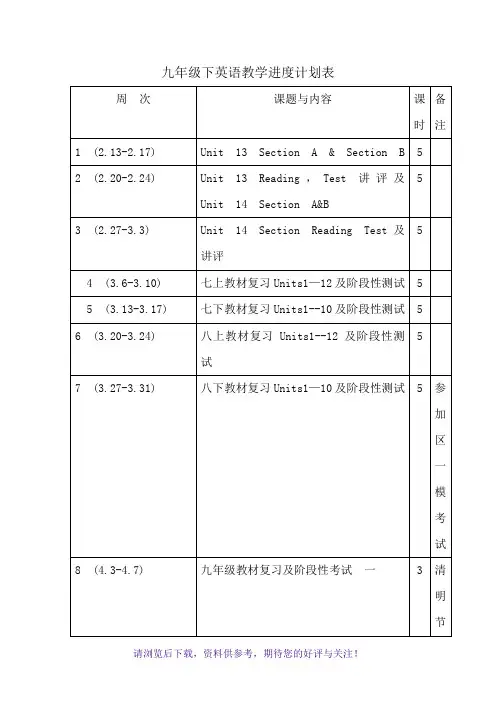
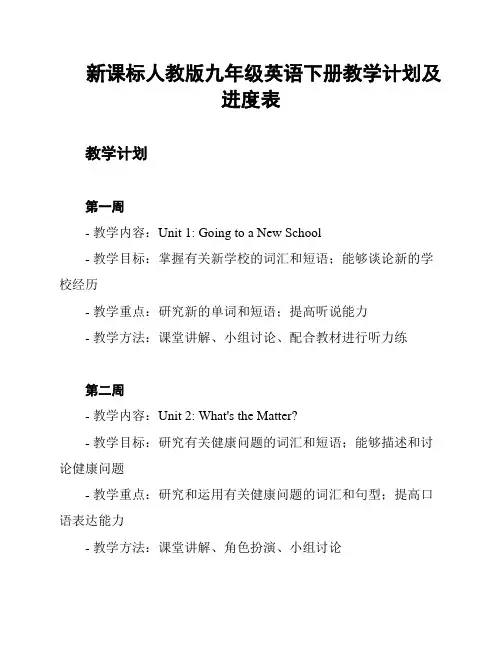
新课标人教版九年级英语下册教学计划及
进度表
教学计划
第一周
- 教学内容:Unit 1: Going to a New School
- 教学目标:掌握有关新学校的词汇和短语;能够谈论新的学校经历
- 教学重点:研究新的单词和短语;提高听说能力
- 教学方法:课堂讲解、小组讨论、配合教材进行听力练
第二周
- 教学内容:Unit 2: What's the Matter?
- 教学目标:研究有关健康问题的词汇和短语;能够描述和讨论健康问题
- 教学重点:研究和运用有关健康问题的词汇和句型;提高口语表达能力
- 教学方法:课堂讲解、角色扮演、小组讨论
第三周
- 教学内容:Unit 3: How Do You Study for a Test?
- 教学目标:研究有关研究方法和考试准备的词汇和短语;能够谈论自己的研究方法和考试准备策略
- 教学重点:研究和运用有关研究方法和考试准备的词汇和句型;提高写作能力
- 教学方法:课堂讲解、小组讨论、个人写作练
第四周
- 教学内容:Unit 4: I used to be afraid of the dark
- 教学目标:研究有关过去经历和惯的词汇和短语;能够描述和讨论自己过去的经历和惯
- 教学重点:研究和运用有关过去经历和惯的词汇和句型;提高听说能力
- 教学方法:课堂讲解、配合教材进行听力和口语练
教学进度表
以上为新课标人教版九年级英语下册教学计划及进度表。
请按照计划进行教学,并根据实际情况做适当调整。
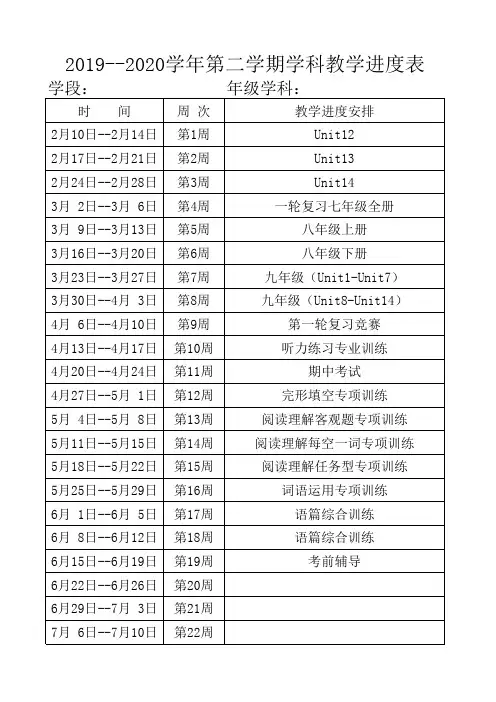
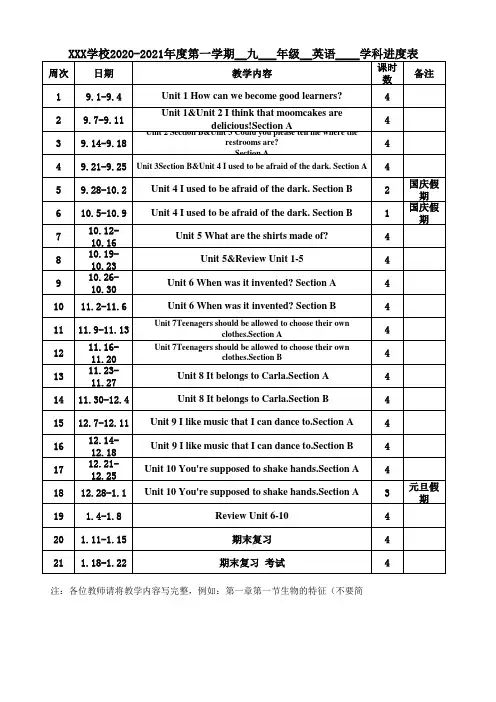
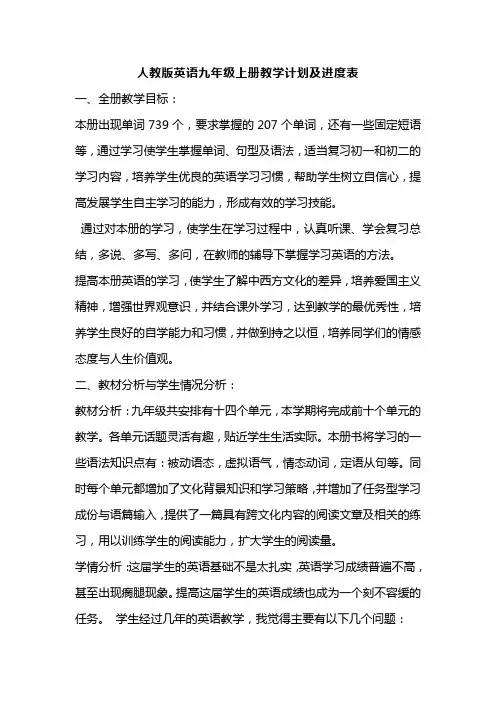
人教版英语九年级上册教学计划及进度表一、全册教学目标:本册出现单词739个,要求掌握的207个单词,还有一些固定短语等,通过学习使学生掌握单词、句型及语法,适当复习初一和初二的学习内容,培养学生优良的英语学习习惯,帮助学生树立自信心,提高发展学生自主学习的能力,形成有效的学习技能。
通过对本册的学习,使学生在学习过程中,认真听课、学会复习总结,多说、多写、多问,在教师的辅导下掌握学习英语的方法。
提高本册英语的学习,使学生了解中西方文化的差异,培养爱国主义精神,增强世界观意识,并结合课外学习,达到教学的最优秀性,培养学生良好的自学能力和习惯,并做到持之以恒,培养同学们的情感态度与人生价值观。
二、教材分析与学生情况分析:教材分析:九年级共安排有十四个单元,本学期将完成前十个单元的教学。
各单元话题灵活有趣,贴近学生生活实际。
本册书将学习的一些语法知识点有:被动语态,虚拟语气,情态动词,定语从句等。
同时每个单元都增加了文化背景知识和学习策略,并增加了任务型学习成份与语篇输入,提供了一篇具有跨文化内容的阅读文章及相关的练习,用以训练学生的阅读能力,扩大学生的阅读量。
学情分析:这届学生的英语基础不是太扎实,英语学习成绩普遍不高,甚至出现瘸腿现象。
提高这届学生的英语成绩也成为一个刻不容缓的任务。
学生经过几年的英语教学,我觉得主要有以下几个问题:(一)学生掌握的词汇量太少。
有相当部分的七,八年级的单词都还不会,这将会直接影响学生对九年级新知识的理解与接受,同时做题时阅读理解和完形填空部分得分率也不高。
(二)学生在学习英语时有惰性。
学生不善于做英语笔记,当堂会的内容,接下来会很快忘记,再则,相当一部分学生没有养成背诵英语课文的习惯,学过就忘。
(三)学生对英语的学习兴趣不高,尤其是那些偏科和成绩较落后的同学,总是觉得英语太难,索性就不学了,甚至课堂上就不听老师讲授。
(四)积压问题。
即使班里成绩较好的学生,在遇到问题时不能够积极找老师解决,造成不会的问题增加,乃至于影响对英语学习的兴趣。
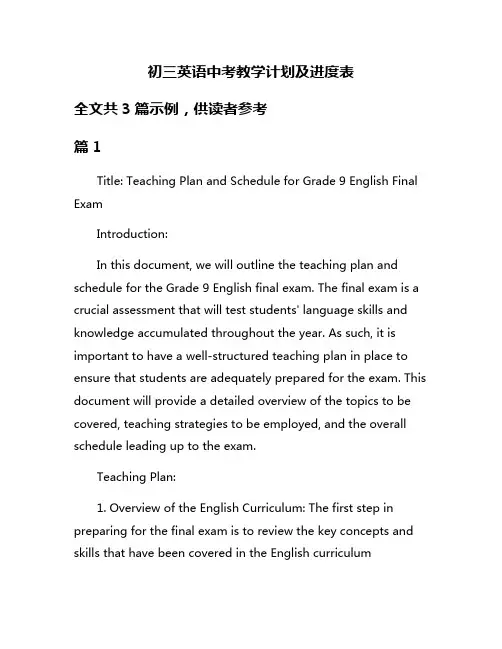
初三英语中考教学计划及进度表全文共3篇示例,供读者参考篇1Title: Teaching Plan and Schedule for Grade 9 English Final ExamIntroduction:In this document, we will outline the teaching plan and schedule for the Grade 9 English final exam. The final exam is a crucial assessment that will test students' language skills and knowledge accumulated throughout the year. As such, it is important to have a well-structured teaching plan in place to ensure that students are adequately prepared for the exam. This document will provide a detailed overview of the topics to be covered, teaching strategies to be employed, and the overall schedule leading up to the exam.Teaching Plan:1. Overview of the English Curriculum: The first step in preparing for the final exam is to review the key concepts and skills that have been covered in the English curriculumthroughout the year. This will provide students with a solid foundation on which to build their exam preparation.2. Revision of Grammar and Vocabulary: A significant portion of the exam will test students' understanding of grammar rules and vocabulary. As such, it is important to dedicate ample time to revising these concepts. This can be done through a combination of in-class exercises, homework assignments, and online resources.3. Reading Comprehension Practice: Another key component of the exam is reading comprehension. Students will be required to read and understand a variety of texts, including fiction, non-fiction, and poetry. To prepare for this, students should engage in regular reading practice and participate in class discussions on the texts.4. Writing Skills Development: The final exam will also assess students' writing skills, including their ability to write essays, letters, and reports. To build these skills, students should practice writing regularly and receive feedback on their work from teachers and peers.Teaching Strategies:1. Interactive Learning: To keep students engaged and motivated, it is important to incorporate interactive learning activities into the teaching plan. This can include group work, debates, role-plays, and games that reinforce key concepts and skills.2. Differentiated Instruction: Every student learns differently, so it is important to tailor instruction to meet the individual needs of each student. This can be done through providing extra support for struggling students, challenging activities for advanced students, and accommodations for students with learning disabilities.3. Technology Integration: Technology can be a valuable tool for enhancing the learning experience. Teachers can use online resources, educational apps, and multimedia presentations to supplement traditional teaching methods and provide students with additional opportunities to practice and learn.Schedule:- Week 1-2: Overview of the English curriculum and revision of grammar and vocabulary.- Week 3-4: Reading comprehension practice and analysis of literary texts.- Week 5-6: Writing skills development and practice essay writing.- Week 7-8: Review of all topics covered and exam preparation.Conclusion:By following this teaching plan and schedule, students will be well-prepared for the Grade 9 English final exam. It is important to provide students with a supportive learning environment, engaging activities, and personalized instruction to help them achieve success on the exam. It is hoped that this document will serve as a useful guide for teachers as they prepare their students for this important assessment.篇2Title: Teaching Plan and Schedule for the Grade 9 English Final ExamIntroductionIn the final year of middle school, Grade 9 students are required to take the English subject final exam. To ensure thatstudents are well-prepared for the exam, it is important to have a comprehensive teaching plan and schedule that covers all the necessary topics and skills. This document outlines the teaching plan and schedule for the Grade 9 English final exam.Teaching Plan1. Listening Skills- Introduce listening exercises that focus on different accents, speeds, and levels of difficulty.- Provide students with a variety of listening materials such as dialogue, monologue, and news reports.- Practice listening skills through activities such asfill-in-the-blank, multiple-choice questions, and short-answer questions.2. Speaking Skills- Encourage students to participate in class discussions, debates, and role-plays.- Provide opportunities for students to practice speaking through presentations, speeches, and group work.- Focus on improving pronunciation, intonation, and fluency in spoken English.3. Reading Skills- Introduce a wide range of reading materials including fiction, non-fiction, and poetry.- Teach students how to skim and scan texts, identify main ideas, and make inferences.- Practice reading comprehension through exercises such as true or false statements, matching exercises, and answering questions based on the text.4. Writing Skills- Teach students how to write different types of essays such as narrative, descriptive, argumentative, and expository.- Provide guidance on structuring essays, organizing ideas, and using appropriate language.- Practice writing skills through regular writing assignments, peer feedback, and revision.5. Vocabulary and Grammar- Introduce new vocabulary words and phrases through reading materials, listening exercises, and word games.- Teach grammar rules and structures through explanations, examples, and practice exercises.- Provide opportunities for students to use new vocabulary and grammar in speaking and writing tasks.ScheduleMonth 1:- Listening skills: Introduce basic listening exercises and strategies.- Speaking skills: Focus on pronunciation and fluency in spoken English.Month 2:- Reading skills: Introduce different types of reading materials and comprehension exercises.- Writing skills: Teach students how to write basic essays and paragraphs.Month 3:- Vocabulary and grammar: Introduce new vocabulary words and grammar rules.- Review and practice all skills through integrated tasks and assessments.ConclusionWith a well-planned teaching plan and schedule, Grade 9 students can develop the necessary skills and knowledge to perform well in the English final exam. By focusing on listening, speaking, reading, writing, vocabulary, and grammar, students will be able to demonstrate their English proficiency and achieve success in the exam. It is essential to provide students with a supportive and engaging learning environment that encourages them to practice and improve their English skills throughout the school year.篇3Teaching Plan and Schedule for the Third Year English Final Exam1. Objectives of Teaching PlanThe teaching plan for the third-year English final exam is designed to help students review and consolidate their knowledge of English language skills and content learned throughout the year. The plan aims to enhance students' listening, speaking, reading, and writing abilities, as well as toimprove their grammar, vocabulary, and comprehension skills. Additionally, the plan focuses on exam preparation strategies, test-taking techniques, and time management skills to help students perform well in the final exam.2. Teaching ScheduleWeek 1: Review of Grammar and Vocabulary- Review key grammar points and vocabulary from throughout the year- Practice exercises and worksheets to reinforce understanding- Homework assignments to test comprehension and application of grammar and vocabularyWeek 2: Listening and Speaking Skills- Listening comprehension exercises to improve listening skills- Speaking activities to enhance oral communication and fluency- Role-plays, dialogues, and group discussions to practice speaking in various contextsWeek 3: Reading Comprehension and Writing Skills- Reading passages and articles to improve reading comprehension- Writing tasks such as essays, letters, and reports to develop writing skills- Peer editing and feedback sessions to improve writing qualityWeek 4: Exam Preparation and Test-Taking Strategies- Practice exams to simulate the exam environment- Review of exam format, structure, and requirements- Tips and strategies for managing time, tackling different question types, and avoiding common mistakesWeek 5: Review and Revision- Review of all topics covered throughout the teaching plan- Revision of grammar, vocabulary, listening, speaking, reading, and writing skills- Final practice exams and feedback sessions3. Evaluation and Assessment- Formative assessment through quizzes, tests, and homework assignments to monitor student progress- Summative assessment through final exams to evaluate students' overall performance- Feedback and review sessions to address areas of improvement and provide additional support as needed4. ConclusionThe teaching plan and schedule outlined above provide a comprehensive framework for preparing students for thethird-year English final exam. By focusing on key language skills, content, and exam strategies, students will have the necessary tools and knowledge to succeed in the exam. With consistent practice, revision, and support from teachers, students will be well-prepared to demonstrate their English proficiency and achieve their academic goals.。
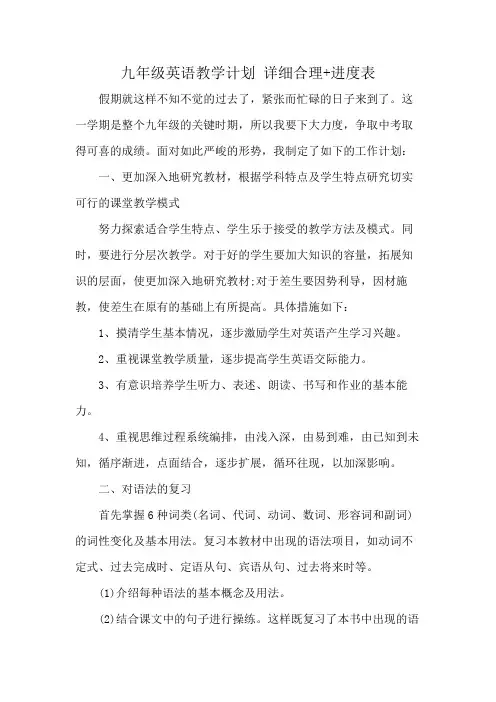
九年级英语教学计划 详细合理+进度表假期就这样不知不觉的过去了,紧张而忙碌的日子来到了。
这一学期是整个九年级的关键时期,所以我要下大力度,争取中考取得可喜的成绩。
面对如此严峻的形势,我制定了如下的工作计划:一、更加深入地研究教材,根据学科特点及学生特点研究切实可行的课堂教学模式努力探索适合学生特点、学生乐于接受的教学方法及模式。
同时,要进行分层次教学。
对于好的学生要加大知识的容量,拓展知识的层面,使更加深入地研究教材;对于差生要因势利导,因材施教,使差生在原有的基础上有所提高。
具体措施如下:1、摸清学生基本情况,逐步激励学生对英语产生学习兴趣。
2、重视课堂教学质量,逐步提高学生英语交际能力。
3、有意识培养学生听力、表述、朗读、书写和作业的基本能力。
4、重视思维过程系统编排,由浅入深,由易到难,由已知到未知,循序渐进,点面结合,逐步扩展,循环往现,以加深影响。
二、对语法的复习首先掌握6种词类(名词、代词、动词、数词、形容词和副词)的词性变化及基本用法。
复习本教材中出现的语法项目,如动词不定式、过去完成时、定语从句、宾语从句、过去将来时等。
(1)介绍每种语法的基本概念及用法。
(2)结合课文中的句子进行操练。
这样既复习了本书中出现的语法项目,又巩固了课文中的句子。
可谓一举两得。
(3)每复习完一类语法,就作相应的练习题,并且从网上下载一些相关的习题,以便查漏补缺。
三、对单词、词组、句型的复习(1)了解并掌握基本构词法,如派生词、合成词、前缀、后缀等。
掌握构词法可以大大增加学生的词汇量。
从而掌握背词技巧,减少背词压力。
(2)运用选择、判断及对话等多种形式,将各课的词组、句型归纳起来,做专项练习。
将单词融入词组、句型中。
在复习词组、句型的同时,也复习了单词,使这三项练习融会贯通,融为一体。
四、多做模拟题,并且每次考完都要做一个总结,从中找出自己的不足初三阶段的复习工作十分关键。
我要在这样的大环境下,努力挑战自己的能力极限,严格规范课前准备,立足提高课堂效率,重视课后反思,努力探索教育教学规律,争做研究型的教师。
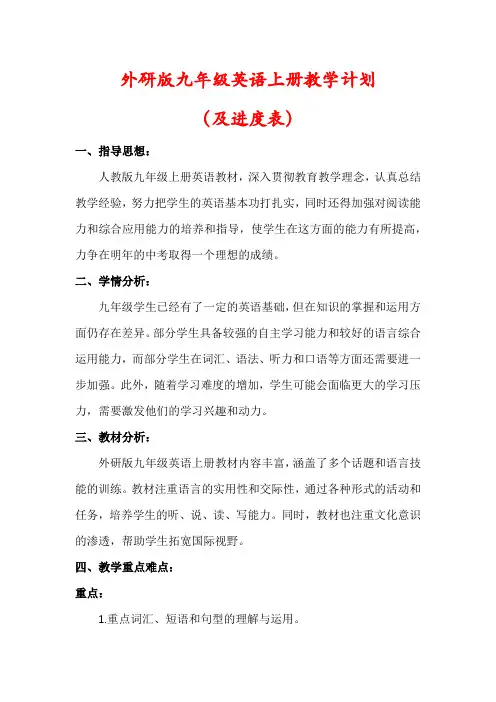
外研版九年级英语上册教学计划(及进度表)一、指导思想:人教版九年级上册英语教材,深入贯彻教育教学理念,认真总结教学经验,努力把学生的英语基本功打扎实,同时还得加强对阅读能力和综合应用能力的培养和指导,使学生在这方面的能力有所提高,力争在明年的中考取得一个理想的成绩。
二、学情分析:九年级学生已经有了一定的英语基础,但在知识的掌握和运用方面仍存在差异。
部分学生具备较强的自主学习能力和较好的语言综合运用能力,而部分学生在词汇、语法、听力和口语等方面还需要进一步加强。
此外,随着学习难度的增加,学生可能会面临更大的学习压力,需要激发他们的学习兴趣和动力。
三、教材分析:外研版九年级英语上册教材内容丰富,涵盖了多个话题和语言技能的训练。
教材注重语言的实用性和交际性,通过各种形式的活动和任务,培养学生的听、说、读、写能力。
同时,教材也注重文化意识的渗透,帮助学生拓宽国际视野。
四、教学重点难点:重点:1.重点词汇、短语和句型的理解与运用。
2.宾语从句、定语从句等语法知识的掌握。
3.提高阅读和写作能力。
4.培养英语思维和跨文化交际能力。
难点:1.复杂语法结构的理解和运用,如定语从句的关系词选择。
2.阅读理解中深层含义的理解和推理判断。
3.写作中如何使语言更丰富、逻辑更清晰。
五、教学目标:(一). 语言知识目标:1.掌握本册教材中的重点词汇、短语和句型。
2.熟练运用各种时态、语态和从句等语法知识。
3.扩大词汇量,提高词汇的运用能力。
(二). 语言技能目标:1. 提高听力理解能力,能听懂英语广播、影视节目等。
2.增强口语表达能力,能流利地进行日常交流和话题讨论。
3.提升阅读理解能力,能理解并分析各类英语文章。
4.加强写作能力,能写出结构完整、语言准确、内容丰富的短文。
(三). 情感态度目标:1.培养学生学习英语的兴趣和积极性,增强自信心。
2.培养学生的合作意识和团队精神。
3.引导学生了解不同文化,增强跨文化交际意识。
六、教学措施:1. 优化课堂教学,采用多样化的教学方法,如情景教学、任务型教学等,激发学生的学习兴趣。
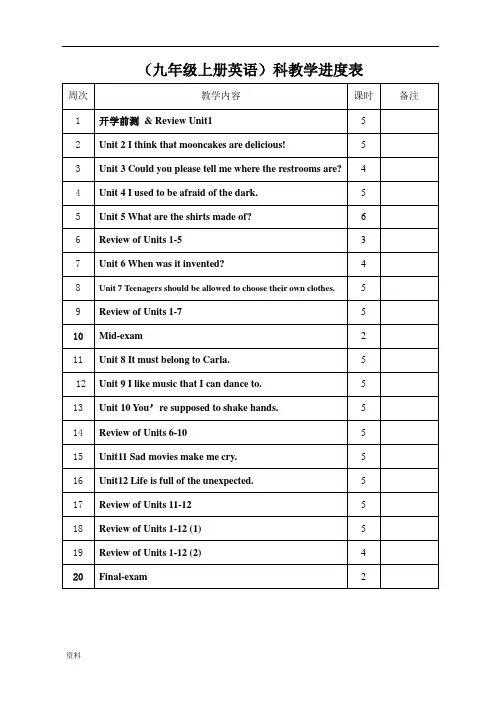
内部资料,仅供参考。
资料本资料仅供参考一、考试中途应饮葡萄糖水大脑是记忆的场所,脑中有数亿个神经细胞在不停地进行着繁重的活动,大脑细胞活动需要大量能量。
科学研究证实,虽然大脑的重量只占人体重量的2%-3%,但大脑消耗的能量却占食物所产生的总能量的20%,它的能量来源靠葡萄糖氧化过程产生。
据医学文献记载,一个健康的青少年学生30分钟用脑,血糖浓度在120毫克/100毫升,大脑反应快,记忆力强;90分钟用脑,血糖浓度降至80毫克/100毫升,大脑功能尚正常;连续120分钟用脑,血糖浓度降至60毫克/100毫升,大脑反应迟钝,思维能力较差。
我们中考、高考每一科考试时间都在2小时或2小时以上且用脑强度大,这样可引起低血糖并造成大脑疲劳,从而影响大脑的正常发挥,对考试成绩产生重大影响。
因此建议考生,在用脑60分钟时,开始补饮25%浓度的葡萄糖水100毫升左右,为一个高效果的考试加油。
二、考场记忆“短路”怎么办呢?对于考生来说,掌握有效的应试技巧比再做题突击更为有效。
1.草稿纸也要逐题顺序写草稿要整洁,草稿纸使用要便于检查。
不要在一大张纸上乱写乱画,东写一些,西写一些。
打草稿也要像解题一样,一题一题顺着序号往下写。
最好在草稿纸题号前注上符号,以确定检查侧重点。
为了便于做完试卷后的复查,草稿纸一般可以折成4-8块的小方格,标注题号以便核查,保留清晰的分析和计算过程。
2.答题要按先易后难顺序不要考虑考试难度与结果,可以先用5分钟熟悉试卷,合理安排考试进度,先易后难,先熟后生,排除干扰。
考试中很可能遇到一些没有见过或复习过的难题,不要蒙了。
一般中考试卷的题型难度分布基本上是从易到难排列的,或者交替排列。
3.遇到容易试题不能浮躁遇到容易题,审题要细致。
圈点关键字词,边审题边画草图,明确解题思路。
有些考生一旦遇到容易的题目,便觉得心应手、兴奋异常,往往情绪激动,甚至得意忘形。
要避免急于求成、粗枝大叶,防止受熟题答案与解题过程的定式思维影响,避免漏题,错题,丢掉不该丢的分。